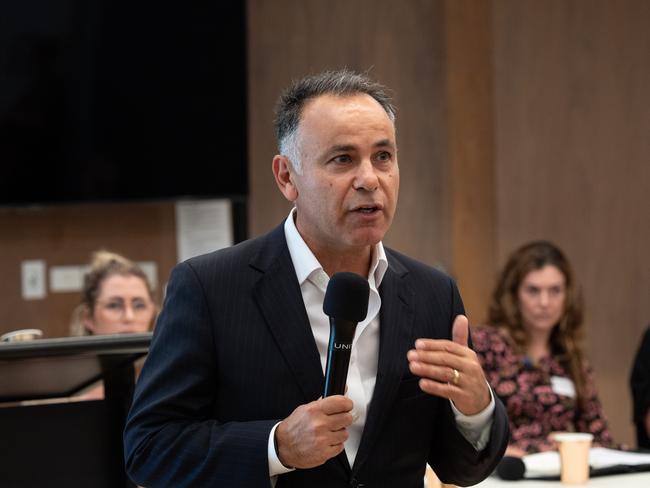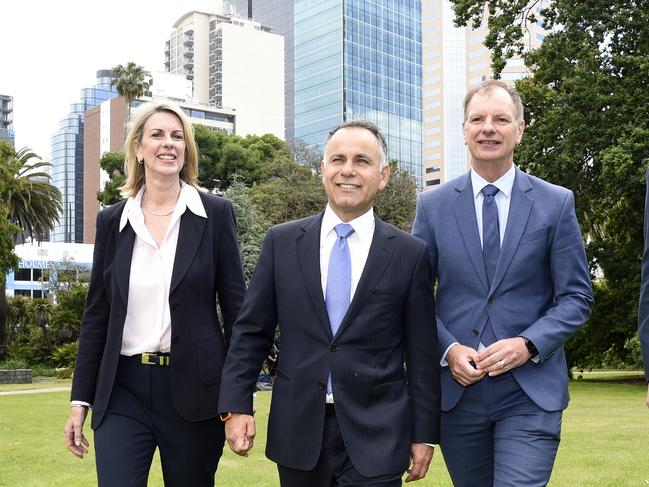Shannon Deery: Pesutto strikes right balance early on rocky road to party rival
John Pesutto has so far proved he’s willing to walk the talk. But his game plan leaves room for significant challenges.
Opinion
Don't miss out on the headlines from Opinion. Followed categories will be added to My News.
He’s barely got his feet back under the desk, but new Liberal leader John Pesutto is already taking the state opposition in a fresh direction.
When he was narrowly elected to the top job in December, having won back his seat at the election, Pesutto promised to be more constructive in opposition.
And he does appear determined to do just that.
“The party under my leadership will work to reach the broadest possible audience of Victorians,” he said then.
“These next four years are going to be really challenging for the people of Victoria and we need a government that is pushed to do its level best.
“We will be a constructive opposition, but we will apply scrutiny where it is necessary to do so.”
We get so accustomed to politician speak that it’s easy to dismiss most of what they say as spin, deflection or self-serving hype.

But Pesutto is showing he’s willing to walk the talk.
Last week his opposition backed moves to relax the bail laws toughened up in the wake of the 2017 Bourke St tragedy.
As far as throwing bipartisan support behind a sensitive issue, it doesn’t get much more daring than to back changes to laws that will make it easier for accused crooks to stay out of jail.
That it’s one of his first major policy positions is a clear signal of change.
Increasingly the Liberal Party has been criticised for failing to offer a constructive or viable alternative.
Too often it has been seen as opposing merely for opposition’s sake.
The two-plus years of the Covid-19 pandemic only exacerbated this criticism.
While it played a key role in keeping the government in check as it sought extraordinary powers, it was at the same time seen as obstructionist.
This criticism applied to the party under Matthew Guy and Michael O’Brien, who preceded him.
But with Victoria’s prison population out of control, and a chronic backlog of cases in the courts doing little to help, Pesutto knows something’s got to give.
His shadow attorney-general Michael O’Brien said last week the opposition was open to sensible changes to bail laws.
“With jails overcrowded and Labor’s court backlogs causing massive delays in matters going to trial, we would consider any sensible reform proposals,” Mr O’Brien said.
“But given the horrific crimes which led to bail laws being tightened – including Bourke St – Labor must not put community safety at risk.”

The review was prompted by the Bourke St incident in which a motorist, James Gargasoulas, deliberately mowed down dozens of innocent people, leaving six dead.
He was out of prison on bail at the time. He should not have been. He had shown scant disregard for the court, thumbed his nose at authorities, and breached his bail conditions repeatedly before being given yet another chance.
The bail changes were meant to make it harder for people like Gargasoulas to be free.
Instead, they have had a disproportionate impact on those accused of low-level offending, especially women, Aboriginals, children, and people living with disability.
In some cases the laws, the most onerous in the country, have left magistrates no option but to jail low-level, nonviolent offenders.
The opposition’s conditional support of easing the laws surprised some Liberals.
Among the rank and file it will inflame some sections of the base, who run with the “lock ’em up and throw away the key” mentality.
Just four years ago the Liberals ran a disastrous law-and-order election campaign centred on African gangs.

“The focus on ‘African gangs’ became a distraction for some key voters who saw it as a political tactic rather than an authentic problem to be solved by initiatives that would help make their neighbourhoods safer,” the opposition’s post 2018 election review found.
“Regrettably the post-election market research study shortly after the campaign showed only 6 per cent of the voters claimed that it actually influenced their vote and then not necessarily to our advantage,” it said.
As shadow attorney-general at the time, Pesutto was a key figure in that campaign.
He appears to have heeded the message.
In adopting a sensible bipartisan approach, Pesutto will pick his battles as seeks to appeal to a broader cross-section of voters.
And the argument for bail reform is one he knows he would win in the party room.
While some MPs might reject the idea, he knows he has the support of Brad Battin, who he beat by one vote in the leadership contest.
Battin, and therefore at least some of his loyal backers, is a big believer in rehabilitative measures over imprisonment when suitable.
He has long advocated for sensible reform in the justice space.
Playing ball with the government where sensible rather than merely opposing its work at every opportunity can help Pesutto grow support in the demographics he desperately needs.
But it also presents him with a significant challenge: how to modernise the party and make a viable path to government without blowing up the partyroom.





